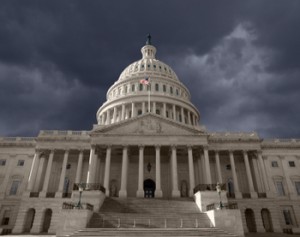
The federal government shutdown persists, President Trump formally nominates Andrew Wheeler as EPA Administrator, and more…
IN THE NEWS
- Over 800,000 federal workers did not receive paychecks this week due to the ongoing government shutdown. Some were told not to report to work during the shutdown, and others deemed “essential”—such as officers at the U.S. Transportation Security Administration—have been required to work without pay. Other agency impacts include canceled food safety inspections by the U.S. Food and Drug Administration and a lapse in funding for housing assistance programs by the U.S. Department of Housing and Urban Development. On January 12, the government shutdown will become the longest one on record.
- President Donald J. Trump formally nominated Andrew Wheeler to serve as Administrator of the U.S. Environmental Protection Agency (EPA). Wheeler has served as Acting Administrator of EPA since the resignation of former Administrator Scott Pruitt in July of 2018 and has reportedly “done an outstanding job” according to Senator John Barrasso (R-Wyo.). Environmental groups have opposed the nomination, however, with Brett Hartl of the Center for Biological Diversity calling Wheeler “the most dangerous EPA administrator of all time.”
- The U.S. House of Representatives adopted new House rules, including mandatory ethics training for House members and a ban on employment discrimination against LGBTQ staffers. U.S. Representative David Cicilline (D-R.I.), who had proposed these provisions, stated that the rules show that the House is “serious about rooting out corruption.” Some Democrats opposed other parts of the rules package such as the “pay-as-you-go” provision—a requirement that new spending be matched by equivalent cuts—which U.S. Representative Alexandria Ocasio-Cortez (D-N.Y.) described as “a dark political maneuver.”
- Nellie Liang, former director of the Office of Financial Stability Policy and Research at the Federal Reserve Board, withdrew as nominee for a subsequent position on the Board of Governors of the Federal Reserve System. President Trump had nominated Liang in September, but Senate Republicans did not support the nomination. Liang reportedly stated that she withdrew due to “the likelihood of a prolonged process,” which would have resulted “in professional limbo for too long.”
- Governor Doug Ducey (R) of Arizona renewed a moratorium on all new state agency rulemaking. Ducey stated that “reducing regulatory burdens” in the state was “essential to growth” and that the order promoted a “stable regulatory environment” for small business owners and entrepreneurs. The moratorium was Ducey’s first act upon taking office in 2015, and he has renewed it every year since.
- An advisor to the Court of Justice of the European Union (EU) recommended that the EU’s “right to be forgotten”—requiring search engines to remove search results about a person at that person’s request—should only apply within the EU. “The fundamental right to be forgotten must be balanced against other fundamental rights,” said the office of the advisor, including “the legitimate public interest in accessing the information sought.”
- The European Banking Authority (EBA) advised the European Commission to consider whether the European Union should regulate crypto-assets, such as virtual currencies and tokens. In a report, the EBA noted that crypto-assets usually “fall outside the scope of EU financial services regulation,” causing EU member states to take “divergent approaches to the regulation of these activities.” The EBA raised a concern that the absence of EU regulation of crypto-assets creates risks in consumer protection and market integrity.
- World Bank President Jim Yong Kim announced his resignation as head of the World Bank Group (WBG), which lends capital to national governments. Peter McCawley of the Australian National University called Obama-appointed Kim’s resignation “an unexpected gift to Donald Trump.” Scott Morris, a senior fellow at the Center for Global Development, stated in an interview that Kim’s early departure was a “surprise” and questioned whether new bank leadership would continue to “address the effects of climate change” by financing clean energy projects as Kim did during his tenure.
- The city council of Cambridge, Massachusetts voted 9-0 to petition the state legislature for permission to include a third gender “X” on city birth certificates. The move follows similar actions by New York City and several states that have also included a third gender option on birth certificates. Mayor Marc McGovern (D) reportedly stated that lawmakers were “long overdue” to consider gender issues in a new light and that the proposal was “a step” in that direction.
WHAT WE’RE READING THIS WEEK
- In a recent paper, Kern Alexander, a professor at the University of Zurich in Switzerland, and Paul Fisher, a fellow at the Cambridge University Institute for Sustainability Leadership in the United Kingdom, discussed how banking regulation can promote environmental sustainability. Alexander and Fisher observed that “banks have a tendency” to focus on short-term policy but that environmental issues can “create negative externalities” in the long run. They proposed that regulators account for sustainability issues when managing risk and encouraged regulators and banks to exchange information to understand environmental effects of financial policy.
- The contemporary art market is highly unregulated, argued Hannah Rose Browning Emmert of The New School in a paper for the Research Association of Interdisciplinary Studies. As investors increasingly treat art as a financial asset, she wrote, the art market suffers from a lack of price transparency as well as insider trading—which is particularly “alarming” when art is used as collateral for investments by pension funds. Because art valuations are “unregulated and volatile,” Emmert implored consumers to make informed investment decisions by questioning whether employers were using art to support retirement benefits.
- When it comes to purported bad behavior by Facebook, Google, and other Internet platforms, “self-regulation clearly has not worked,” wrote political commentator Steven Hill in a column for The Washington Post. Hill wrote that Internet-based companies should be regulated through a “digital license” system, where a government could “evict” the company from its country for violating the terms of its license. Acknowledging that “such interventions have been used by repressive governments to censor speech,” Hill nevertheless argued that countries could still enforce digital licenses in a way that promotes democracy and the rule of law.



